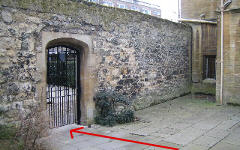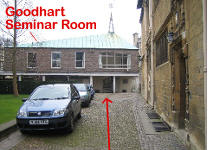|
|
|
|
|||||||||||||||||||||||||||
|---|---|---|---|---|---|---|---|---|---|---|---|---|---|---|---|---|---|---|---|---|---|---|---|---|---|---|---|---|---|
|
|
|
Find some answers to some questions about the JDG in this page. Not interested in all the questions? See whether you are interested in the answers. Answers redefine questions, just as questions define answers.
In 2000, Nick Barber (then Fellow of Brasenose) took over from Timothy Endicott as convenor, and was joined in 2001 by Samantha Besson (then JRF at Queen's). The meetings took place in the Danson room at Trinity College - the JDG's location till 2006. D.Phil. students Dwight Newman and Danny Priel became convenors in Michaelmas 2003. Under their leadership (2003-05), the JDG continued to develop as an integral part of the Oxford Jurisprudence community - as well as one of its windows to look into the outside world (and a window for the outside world to look into Oxford Jurisprudence). In the year 2005-06, the JDG was co-convened by Michelle M. Dempsey, Maris K÷pcke TinturÚ and Paul Yowell, in 2006-07 we welcomed Franšois Tanguay-Renaud to replace Michelle, and in 2007-08 Jorge Menezes Oliveira and Guy Sela joined Maris in convening the JDG and celebrating its 10th anniversary. For 2008-09, the convenors are Maris K÷pcke TinturÚ, Guy Sela, and Raquel van der Wijk. The JDG was and remains a highly popular forum
hosting lively debates amongst graduates, faculty members and anyone
with an interest in the philosophy of law. Thanks to all who have made
possible the JDG as we know it today! -- p.s. Amongst the JDG's progeny is this seminar series co-convened by Franšois Tanguay-Renaud at Osgoode Hall Law School. If you know of other JDG diaspora settlements please inform us! The venue of the JDG is the Goodhart Seminar Room in University College. University College is on High Street, opposite All Souls and Queen's.
Our regular meetings take place during term-time on Thursdays at 8pm (except where otherwise indicated). Pre-talk drinks/cookies start at 7.45pm. The presentation + discussion lasts until 9.30pm, and you are welcome to stay for drinks/cookies until 10pm (in the same room). So, in a nutshell...
In the year 2007-08, we will host a series of special events to celebrate the 10th anniversary of the JDG in addition to our regular meetings. Click here for more details. The JDG is a forum to discuss Jurisprudence, broadly understood. This includes: general theory of law (Hart, Kelsen, Austin... and all writings that build on - which also means against - them), 'special' theory of law (philosophical foundations of legal institutions or branches of the law), political philosophy, moral philosophy & ethics, most 'law&' strands (e.g. law&language, law&logic, law&literature, law&economics, law&society, law&religion, law&anthropology, law&neuroscience, law&cinema, law&ideology, law&love, law&photography, law&anatomy, law&coffee...), and the meta-versions of all the above. Speakers usually pre-circulate a paper (downloadable from this section). Although we encourage everyone to read it in advance of the meeting, it is not compulsory to read the paper beforehand to attend or to participate in the discussion. Presentations tend to be given from work in progress - often at an early gestation stage. Speakers therefore find comments, critiques and suggestions particularly useful. The JDG is open to anyone interested in Jurisprudence: teachers and students, Oxford and non-Oxford, lawyers and non-lawyers. The atmosphere is relaxed and participation in the discussion is voluntary -- so feel free to join even if you do not feel comfortable contributing to the discussion. If you are just curious to witness an exchange amongst Oxford jurisprudes, come as well! Speakers are Oxford research students, Oxford faculty, or researchers/faculty based at other institutions (and sometimes from rather different academic backgrounds). We try to keep a mixture between speakers from Oxford and speakers from outside, and between junior and senior speakers. In the academic year 2007-08, the JDG is convened by D.Phil. students Maris K÷pcke TinturÚ, Jorge Menezes Oliveira and Guy Sela. Oxford research students, Jurisprudence faculty and Academic Visitors are amongst the regular attendees of the JDG. At the JDG there is no discrimination on the basis of academic status - everyone has a say and everyone's voice is listened to. What counts is the voice's soundness, not its pedigree... Knowledge increases the more it is shared. If this holds true with regards to any (academic) subject, it is particularly true with regards to Jurisprudence - a subject that is by its very nature in quest for its identity, placed at the delicate juncture between philosophy and law (and other disciplines). Not only theories or arguments are open to discussion, but also the very framework of analysis is. Or should we say it exists through discussion? The validity of ideas depends on their merits, not their sources. Therefore, everyone is welcome to contribute to JDG debates - whether anonymous student or distinguished teacher (or distinguished student or anonymous teacher). That is the key virtue of our 'discussion group' vis-Ó-vis the official lectures and seminars it is meant to complement. Discussion always has a pay-off: learning more Jurisprudence, improving your argumentation skills, seeing your tutor's theses knocked down, gathering potential objections to your points, having your assumptions questioned, debating with (un)like-minded researchers, confirming your suspicions about jurisprudential spies, forcing you to listen to your (academic) opponents, trying a new brand of cookies... or, which is most likely, a combination of all these. |
|
||||||||||||||||||||||||||





